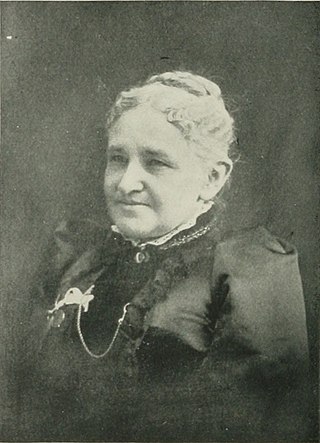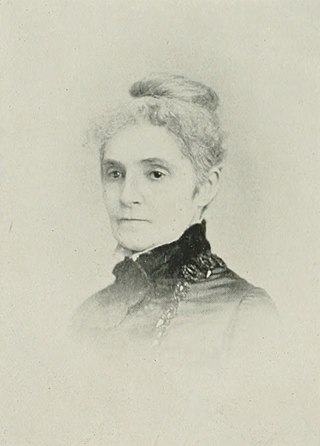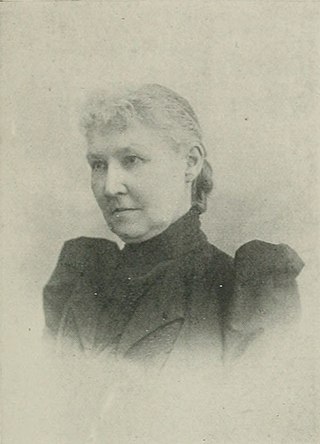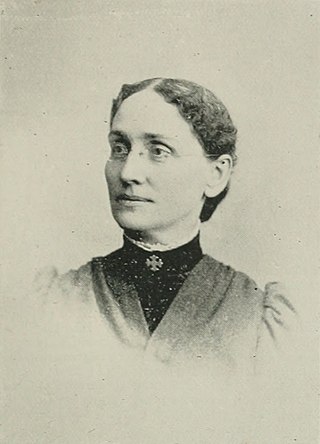
Carlotta Perry, the pen name of Charlotte Augusta Perry, was an American writer of poetry and prose. She was among a group of premier women poets of the late 19th century. Her poems, children's stories, and short stories were published in many of the most read publications of the time including Harper's Magazine, Godey's Lady's Book and Lippincott's Monthly Magazine. Some of her verse can still be found today in Christian newsletters and even in an ad for a paint company describing their shades of white. Known mostly for her poetry, she was also a journalist and was active in many of the journalism and women's organizations during her working life.

Rosa Vertner Jeffrey was an American poet and novelist from Lexington, Kentucky. She was the first southern woman whose literary work attracted attention throughout the US. Her books of poetry include Poems, by Rosa (1857); Daisy Dare and Baby Power (1871); and The Crimson Hand and Other Poems (1881). Her novels include Woodburn (1864) and Marsh (1884).

Harriett Ellen Arey was a 19th-century American educator, author, editor, and publisher. Raised in New England, she was one of the first women in the United States to study in a co-educational environment. In Cleveland, Ohio, she became a contributor to The Daily Cleveland Herald and taught at a girls' school. After marrying, she moved to Wisconsin, and served as "Preceptress and Teacher of English Literature, French, and Drawing" at State Normal School in Whitewater, Wisconsin. After returning to Cleveland, she edited a monthly publication devoted to charitable work, and served on the board of the Woman's Christian Association. Arey was a co-founder and first president of the Ohio Woman's Press Association. Her principal writings were Household Songs and Other Poems and Home and School Training. Arey died in 1901.

Lavilla Esther Allen, also known as Esther Lavilla Allen, was an American author, poet, and reader.

Marion Juliet Mitchell was an American poet and educator. She received a thorough education, and inherited literary tastes from her parents. She contributed extensively both prose and verse to magazines and was the author of a volume of poems. Her poems appeared in several standard collections. Mitchell died in 1917.
Estelle Mendell Amory was an American educator and author. She is better known as a writer by her maiden name, Estelle Mendell. She published a variety of domestic articles, short stories for children, essays on living themes, and occasional poems.

Ella Brockway Avann was a 19th-century American educator and writer. After graduating from Albion College of Michigan, she subsequently became preceptress of that institution. She filled the chair of English literature and also lectured on the history of music. For 10 years, she was president of the Woman's Foreign Missionary society. Avann made frequent contributions to the religious press. She held official positions in various literary, social and benevolent societies.

Lucy H. Washington was an American poet and social reformer of the long nineteenth century, active in the temperance movement. For many years, she was engaged in Woman's Christian Temperance Union (WCTU) work, having given addresses in 24 states, and extended her efforts across the country. In 1878, she published a volume of poems, Echoes of Song, and this was followed by Memory's Casket.

Emma Scarr Booth was a British-born American author. Born in England, she emigrated to the United States as a child. She was the author of three volumes, entitled Karan Kringle's Journal; A Willful Heiress; and Poems. Additionally, she composed numerous songs and instrumental pieces.

Cornelia Jane Jordan was an American poet and lyricist associated with the Civil War. Her book of poems entitled Corinth, and other Poems, published after the surrender, was seized by the military commander of Richmond, Virginia and suppressed. She published a volume entitled Richmond, Her Glory and Her Graves. Jordan also contributed many articles to magazines and newspapers, the best of which were "The Battle of Manassas," "The Death of Jackson" and "An Appeal for Jefferson Davis". She was a member of the Alumni of the Convent of the Visitation, Georgetown, Washington, D.C., her alma mater.

Helen A. Manville was an American poet and litterateur of the long nineteenth century. Under the pen name of "Nellie A. Mann", she contributed largely for leading periodicals east and west, and obtained a national reputation as a writer of acceptable verse. At the height of her fame, she decided to stop using the pen name and assume her own. She succeeded in making both names familiar, virtually winning laurels for two cognomens, when ill-health required a pause in her literary work. A collection of her poems was published in 1875, under the title of Heart Echoes, which contained a small proportion of her many verses.

Elizabeth Otis Dannelly was a 19th-century American writer of Southern poetry. Born in Georgia, she was the author, Cactus, or Thorns and Blossoms and Wayside Flowers.

Harriet Mabel Spalding was an American litterateur and poet. She became well known in the highest circles of art and literature in Albany, New York, Chicago, and New York City.

M. Wintermute was an American author and poet whose poems appeared in The Youth's Companion, as well as other papers and magazines. She was a writer of some celebrity, and the author of a volume entitled Eleven Women and Thirteen Men (1887).

Emma Huntington Nason was an American poet, author, and musical composer. When only twelve years old, she began to write in verse. She devoted much time to literature, art and music, in each of which she excelled. Her works included, My Ancestors; Address and poem at the dedication of the Hallowell library, March 9, 1880 with historical sketch ..., 1880; Songs of the orient, 1892; The Tower, with Legends and Lyrics, 1895; Augusta centennial souvenir., 1897; Old colonial houses in Maine built prior to 1776, 1908; and Old Hallowell on the Kennebee, 1909.
Fanny Murdaugh Downing was a 19th-century American author and poet. She was the first resident novelist of Mecklenburg County, North Carolina. Downing's principal publications included: Nameless, a novel, 1865; Perfect though Suffering, a Tale, 1867 ; Florida, a Tale of the Land of Flowers; Pluto, or the Origin of Mint Julep, a story in verse. Most of her poems described her love and devotion for Confederate soldiers. In addition to Pluto, her best known poems were "The Legend of Catawba" and "Dixie".

Mary Ware was an American "southland" poet and prose writer. She contributed poems to various periodicals for more than fifty years. She also published a limited edition of her poems for private distribution.

Katherine Van Allen Grinnell was an American lecturer, author, and social reformer. She was one of the first women in the United States to lecture and write on the place of woman in the scheme of government. Grinnell attained an international reputation and was praised by Frances Willard, Susan B. Anthony, Lady Somerset, and others.
Zuinglius Calvin Graves Jr. was an American Baptist preacher and educator. He is most noted as the first President of the Mary Sharp College (1851–1896), located at Winchester, Tennessee. It was the first women's college in the United States to offer degrees equivalent to the degrees offered at men's colleges – preceding Vassar College by ten years.

Euphemia Johnson Richmond was an American litterateur and author of novels and children's literature. Her early sketches, published in periodicals, were under the pen name, "Effie Johnson", but her later work was under her own name styled as "Mrs. E. J. Richmond".

















